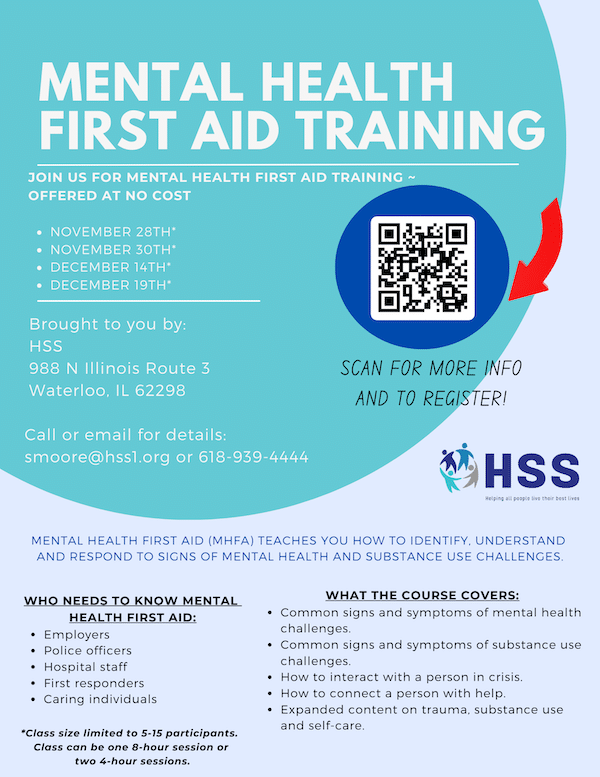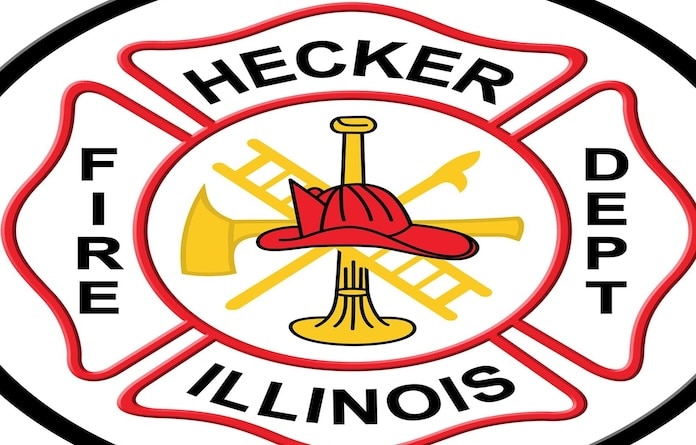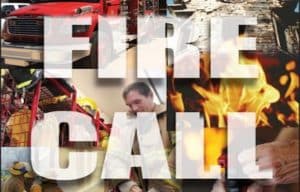First aid for the mind

Human Support Services will soon be conducting several mental health first aid training sessions, part of the organization’s ongoing efforts to improve mental health awareness and care in the community.
Along with other projects and efforts, HSS’ push for mental health first aid in Waterloo and other local communities has been discussed a number of times in recent months as the organization celebrates its 50th anniversary.
Earlier this year in a Republic-Times article outlining mental health concerns regarding local youth, HSS President and CEO Anne Riley spoke about efforts to increase the number of school employees in the area who are trained in mental health first aid for young people.
Riley explained that this education was part of HSS’ Mental Health Awareness and Training Initiative, with another component being training in this kind of care for the wider community.
More recently, HSS Vice President of Behavioral Health Stephanie Moore offered some additional perspective on what mental health first aid is and what the training sessions involve.
Moore explained that the training is designed to teach individuals ways to identify, understand and respond to signs of mental health and substance use challenges.
There are two separate courses, one geared for adults hoping to be trained to care for other adults and another meant for adults who work with and interact with children and wish to be better trained in youth mental health needs.
A graphic shared by HSS (see page 4B) notes employers, hospital staff, police officers and first responders as demographics who ought to receive this sort of training – though Moore said the sessions should be beneficial for anyone interested.
“That’s just one segment of the population, the individuals that we said: employers, police officers, hospital staff, et cetera,” Moore said. “The reality is every adult would benefit from this training because we are always interacting and engaging with others. If you do not fall into one of these professions, it doesn’t necessarily mean that you do not have the capability to provide support for individuals when they are in need.”
She further spoke to the importance of the training as everyone is in need of help at some point, and as a community, individuals need to take care of each other.
While the subject of therapy and receiving mental health support has been notably destigmatized in recent years, Moore said sometimes it’s necessary for someone to hear an outside perspective in order for them to address whatever they’re facing.
“Sometimes when individuals are having challenges, they can’t see beyond the space that they’re in, but other people can see some of the challenges that they’re experiencing,” Moore said. “We have to be able to identify those challenges, know what those challenges look like, and then help accordingly. We are our own help. We have to help each other in order to make sure these concerns are being addressed.”
Moore further spoke to the recent push for mental health first aid training as this particular term seems to have reached wider awareness in just the last few years.
Much of this, she said, can be attributed to the COVID-19 pandemic and the substantial mental health issues that resulted from it.
“We saw that a lot of people struggled mentally during the pandemic,” Moore said. “Statistically, there was a huge increase in alcohol use during the pandemic. Some people were able to successfully integrate themselves back into the flow of things when people started returning to work and individual routines, things were opening up and getting back to what they looked like… The reality is some folks were not able to just integrate themselves back into the fold of things. Because of that, we have seen an increase in supports that are needed, whether it’s adults or children.”
The previously mentioned HSS graphic offers a small outline of what the course consists of, with major topics including common signs and symptoms of both mental health challenges and substance use challenges, how to interact with a person in crisis and how to connect a person with help.
Moore described the training as hands-on and interactive, with participants actively engaging throughout the session.
Currently, sessions through HSS are planned for Nov. 28 and Nov. 30 as well as Dec. 14 and Dec. 19. Classes can be eight hours or split into two four-hour sessions.
These are not the first of these training sessions HSS has offered, as Moore explained that the organization was able to train over 50 individuals in classes that started in May.
She also noted HSS hopes to make the sessions a monthly occurrence so long as attendance numbers stay up.
For more information, email Moore at smoore@hss1.org or call 618-939-4444.






